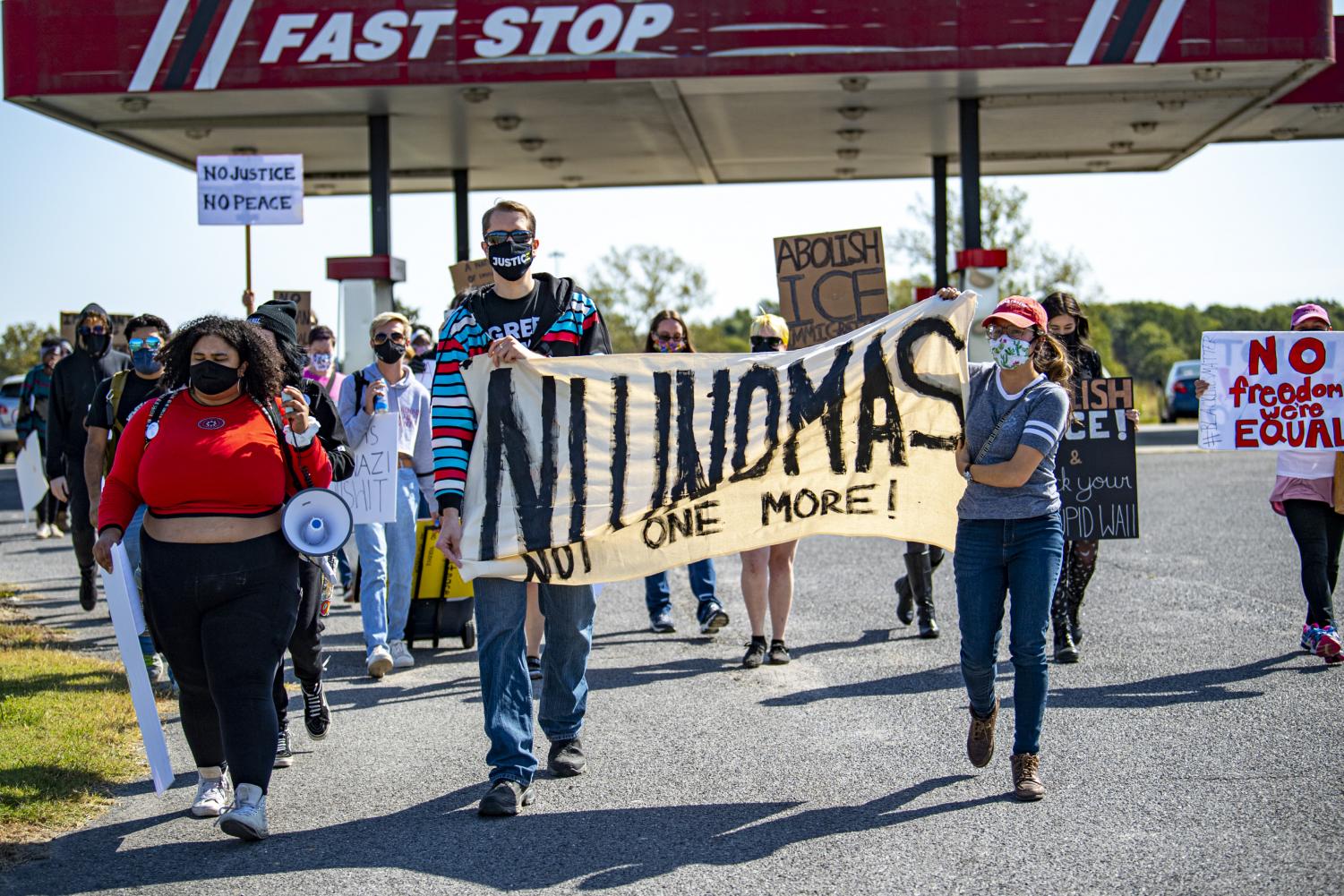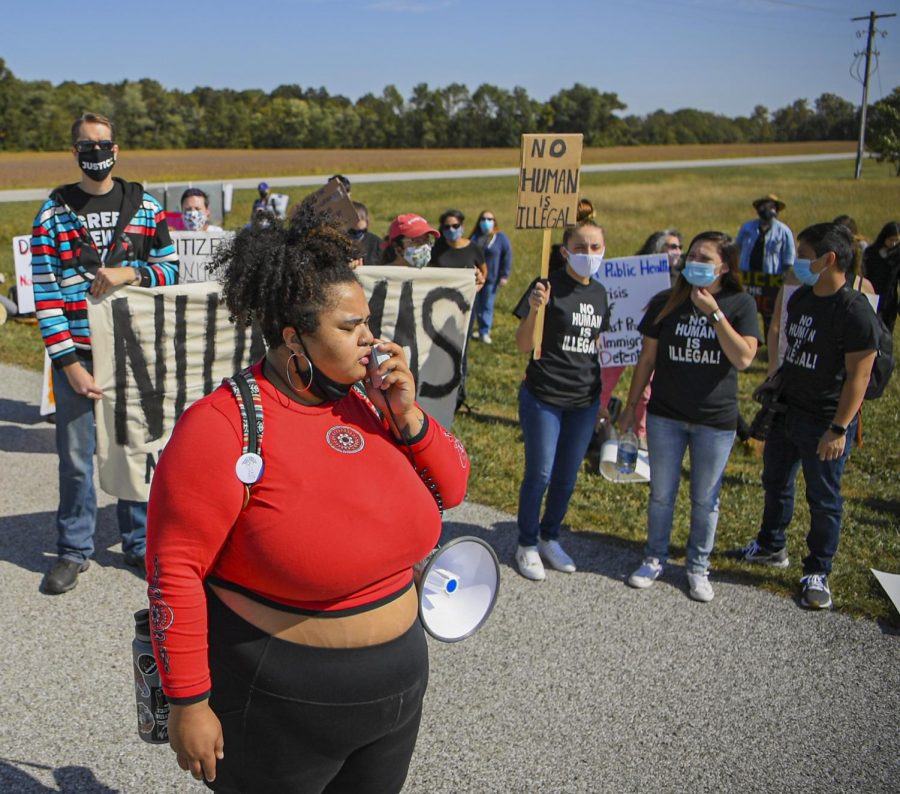“You are not forgotten-” outcry continues over conditions at Pulaski County Detention Center
While no deaths have been reported within the facility because of the virus, the large number of infections coming from a single source have led to concern among the general public.
October 30, 2020
Eleven inmates are isolated and being monitored for COVID-19 at the Pulaski County Detention Center.
This April, the detention center in Ullin, Ill., reported an outbreak of COVID-19 among several detainees. As of Oct. 20, 82 coronavirus cases have been reported within the facility, according to the U.S. Immigration and Customs Enforcement database.
While no deaths have been reported within the facility because of the virus, the large number of infections coming from a single source have led to concern among the general public.
Advertisement
Illinois’ Senators Dick Durbin and Tammy Duckworth released a statement calling on the Department of Health and Human Services and the Department of Homeland Security to investigate health concerns in the detention center.
Several demonstrations have taken place to protest the living conditions at the center.
On Oct. 3, 45 protesters, organized by the Midwest Council for Civil Rights (MCCR) and the Southern Illinois Immigrant Rights Project, gathered outside the center to raise attention to the matter.
(See more: Protests outside Pulaski County Detention Center)
One week later, on Oct. 11, the Carbondale Interfaith Council (CIC) held a prayer vigil outside the facility.
One of the vigil’s attendees, Reverend Robert Flannery said the point of the gathering was to let the detainees know “they’re not forgotten.”
Flannery said the reason for a separate visit to the facility was to separate the protests, which were more about the legal or moral ethics of I.C.E., from the vigil, which was for “pastoral and spiritual care.”
Advertisement*
Father Uriel Salamanca, also attended the vigil last month and has been going to the detention center for the last 10 years to pray for the immigrants.
But due to the COVID-19 lockdowns he is no longer allowed inside the facility.
“I used to go there and pray with them. I read the bible. I would say the eucharist,” Salamanca said. “They gave me 15 minutes to pray with the inmates.”
“No estás olvidado,” was a common chant during the council’s visit, said Flannery, which translates to “you are not forgotten.”
Because they no longer have the ability to visit, members of the CIC and MCCR regularly write letters to the detainees.
Both groups claim ICE officials denied donations meant to assist Pulaski inmates.
Concerns have continued to grow as cases have risen every month compared to the relatively stagnant numbers report by the ICE Chicago field office’s four other detention facilities.
Pulaski is not an isolated incident. ICE detention facilities across the United States have reported 6,743 cases with eight confirmed deaths.
The detention center’s issues do not end with mismanagement of the pandemic.
Cindy Buys, a law professor at Southern Illinois University has directed the Immigrant Detention Project for the past 15 years. During this time she and her students visit detainees “to provide ‘know your rights’ information, and conduct interviews with the detainees about their legal situation,” Buys said.
Buys said there normally were no fewer than 150 immigrant detainees at the Pulaski Detention Center.
But since the start of COVID, to “engage in some level of social distancing” there are now only 70 to 80 immigrants held.
“We normally spend most of our time asking a number of detainees questions about their background and how they ended up at [Pulaski],” Buys said. “We then share that information with an organization in Chicago called the National Immigration Justice Center and they do any followup legal work.”
The NIJC helps more than 13,000 people a year with legal services.
The organization has provided services since 1983 with the help of about 1000 pro-bono lawyers.
On April 16, NIJC provided testimony from two of its clients detained at ICE facilities during the outbreak.
Marco Gomez was held at the Pulaski County Detention Center for over one year before being transferred to the McHenry County Adult Correctional Facility and released this spring.
The McHenry County Adult Correctional Facility is also under the ICE Chicago Field Office’s jurisdiction, “I felt insecure in the jail. We were hearing things, seeing things on the news, but we didn’t see the jail staff doing anything different,” Gomez said.
Gomez continued to describe events at the McHenry Facility, raising concerns about the close spaces and detainees lack of medical attention.
“While we were there there were a lot of people with coughs, and they would always tell us to put a sick call in, but they wouldn’t take a temperature or do anything else,” Gomez said.
(See more: Testimony from inside ICE detention)
Staff reporter George Wiebe can be reached at gwiebe@dailyegyptian.com
To stay up to date with all your southern Illinois news, follow the Daily Egyptian on Facebook and Twitter.
Advertisement




